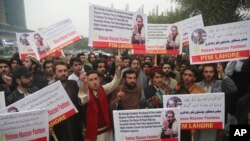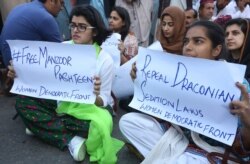Human rights watchdog Amnesty International, in its annual report for Asia for 2019, has accused Pakistan of intensifying its crackdown on human rights, including a clampdown on freedom of expression, failure to control harassment of ethnic and religious minorities, and continuation of a policy of enforced disappearances against its citizens.
"It has become increasingly difficult to fight for human rights in Pakistan at a time when the authorities continue to forcibly disappear people, censor journalists, crack down on peaceful demonstrations and enforce repression through draconian laws,” said Omar Waraich, deputy South Asia director at Amnesty International on Thursday.
The country has faced similar criticism from other rights groups, both national and international.
"Pakistan’s government intensified its clampdown on the media, political opposition, and nongovernmental organizations in 2019,” the group Human Rights Watch said in its World Report 2020 earlier this month.
Saifur Rehman, an elected member of the National Assembly from the ruling party Pakistan Tehreek-e-Insaaf, who also serves on its human rights committee, challenged these allegations and said rights have improved under the current administration.
"It’s a country of 220 million people so some things are bound to happen; however, the situation has improved from before,” he said, adding that the country suffered from lack of resources so it should not be compared to the situation in developed countries.
Manzoor Pashteen arrest
Days before the Amnesty report, police in Pakistan’s northwestern city of Peshawar detained a young firebrand leader of a relatively new movement called Pashtun Tahafuz Movement that campaigns against alleged human rights violations by the country’s powerful military. The arrest of 27-year-old Manzoor Pashteen led to demonstrations in various cities and more arrests in the capital Islamabad.
While the demonstrations were peaceful, police charged the almost two dozen people it arrested with “sedition” among other charges.
Pakistan’s independent and non-partisan body, the Human Rights Commission of Pakistan, called these arrests unconstitutional.
"The arbitrary use of the charge of sedition under an archaic law to curb political dissent – that has in no way incited hatred or violence – indicates how little regard the state has for its citizens’ civil and political liberties,” an HRCP press release said.
One of the issues PTM repeatedly raised was forced disappearances. Under pressure from PTM and other groups, many people who had disappeared and were believed to be in the custody of intelligence agencies returned home.
"Even as hundreds of disappeared people were released throughout 2019, no one was held to account for even one of them,” Amnesty said in its report.






